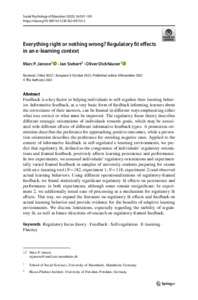|
Everything right or nothing wrong? Regulatory fit effects in an e-learning context
Janson, Marc Philipp
;
Siebert, Jan
;
Dickhäuser, Oliver
![[img]](https://madoc.bib.uni-mannheim.de/63892/1.hassmallThumbnailVersion/s11218-022-09733-3.pdf)  Vorschau |
|
PDF
s11218-022-09733-3.pdf
- Veröffentlichte Version
Download (1MB)
|
|
DOI:
|
https://doi.org/10.1007/s11218-022-09733-3
|
|
URL:
|
https://link.springer.com/article/10.1007/s11218-0...
|
|
URN:
|
urn:nbn:de:bsz:180-madoc-638920
|
|
Dokumenttyp:
|
Zeitschriftenartikel
|
|
Erscheinungsjahr:
|
2023
|
|
Titel einer Zeitschrift oder einer Reihe:
|
Social Psychology of Education
|
|
Band/Volume:
|
26
|
|
Heft/Issue:
|
1
|
|
Seitenbereich:
|
107-139
|
|
Ort der Veröffentlichung:
|
Dordrecht
|
|
Verlag:
|
Springer
|
|
ISSN:
|
1381-2890, 1573-1928
|
|
Sprache der Veröffentlichung:
|
Englisch
|
|
Einrichtung:
|
Fakultät für Sozialwissenschaften > Pädagogische Psychologie (Dickhäuser 2008-)
Außerfakultäre Einrichtungen > GESS - CDSS (SOWI)
|
|
Bereits vorhandene Lizenz:
|
 Creative Commons Namensnennung 4.0 International (CC BY 4.0) Creative Commons Namensnennung 4.0 International (CC BY 4.0)
|
|
Fachgebiet:
|
150 Psychologie
370 Erziehung, Schul- und Bildungswesen
|
|
Abstract:
|
Abstract Feedback is a key factor in helping individuals to self-regulate their learning behavior. Informative feedback, as a very basic form of feedback informing learners about the correctness of their answers, can be framed in different ways emphasizing either what was correct or what must be improved. The regulatory focus theory describes different strategic orientations of individuals towards goals, which may be associated with different effects of different informative feedback types. A promotion orientation describes the preference for approaching positive outcomes, while a prevention orientation describes the preference for avoiding negative ones. Applied to the context of informative feedback in self-regulated e-learning environments, we predict that regulatory fit, defined as the congruence of individuals’ regulatory orientations and framed feedback, positively affects learning persistence and performance. In two experiments, we assessed individuals’ regulatory orientations and experimentally varied framed feedback in samples of university students preparing for exams with an e-learning tool ( N = 182, experiment 1; N = 118, experiment 2) and observed actual learning behaviors. Using different operationalizations of regulatory-framed feedback, we found statistically significant regulatory fit effects on persistence and performance in both experiments, although some remain insignificant. In experiment 2, we additionally tested ease of processing as a mechanism for regulatory fit effects. This way, we expand the literature on regulatory fit effects and feedback on actual learning behavior and provide evidence for the benefits of adaptive learning environments. We discuss limitations, especially regarding the stability of regulatory fit, as well as future directions of research on regulatory-framed feedback.
|
 | Dieser Eintrag ist Teil der Universitätsbibliographie. |
 | Das Dokument wird vom Publikationsserver der Universitätsbibliothek Mannheim bereitgestellt. |
 Suche Autoren in Suche Autoren in
Sie haben einen Fehler gefunden? Teilen Sie uns Ihren Korrekturwunsch bitte hier mit: E-Mail
Actions (login required)
 |
Eintrag anzeigen |
|
|
 ORCID: 0000-0001-5371-1277 ; Siebert, Jan ; Dickhäuser, Oliver
ORCID: 0000-0001-5371-1277 ; Siebert, Jan ; Dickhäuser, Oliver  ORCID: 0000-0002-3126-8398
ORCID: 0000-0002-3126-8398



 Creative Commons Namensnennung 4.0 International (CC BY 4.0)
Creative Commons Namensnennung 4.0 International (CC BY 4.0) Suche Autoren in
Suche Autoren in